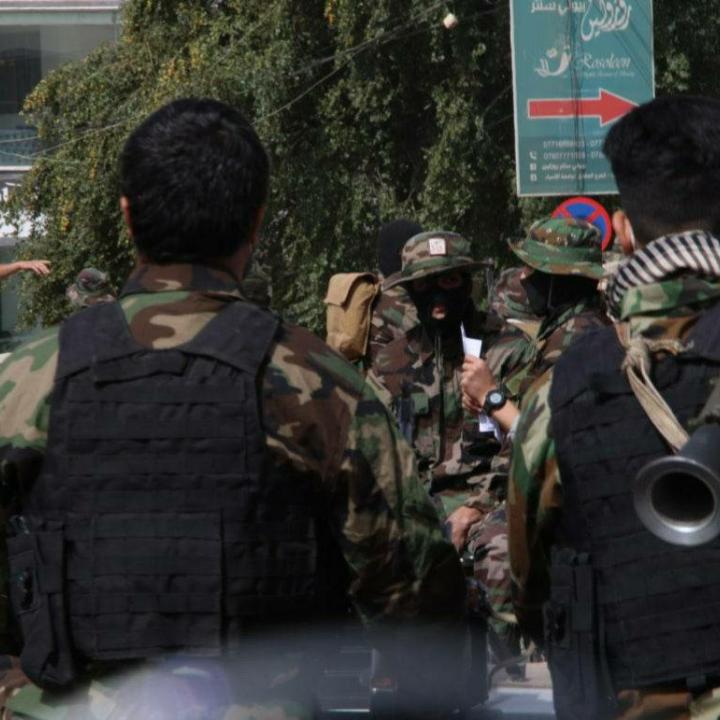
Muqawama Fake News Surrounding Qasim Muslih’s Arrest (Part 2): Release Claims

Militias made a concerted effort to create the false impression that their colleague had been released immediately, and the claim was soon echoed by major global media outlets.
On May 26, the Iraqi state arrested militia leader Qasim Muslih in connection with the May 9 murder of activist Ehab al-Wazni. In June 2020, when fourteen Kataib Hezbollah (KH) members were arrested and thirteen suspects not covered by the warrant were quickly released, muqawama (resistance) groups were able to badly damage the Iraqi government’s credibility by publicizing the release. (The fourteenth suspect, the original target of the raid, was held for some months until acquitted by a court.) After the May 26 arrest, however, the muqawama were unable to make the government cave and secure Muslih's immediate release. Unfortunately, that did not stop them from launching a disinformation operation claiming otherwise.
Phase 1: False Alerts of Muslih’s Release
At 16:44 Baghdad time, in a breaking news post, Asaib Ahl al-Haq outlet Sabereen News falsely claimed that Muslih had been released. A few minutes later, KH-linked channels posted the same claim. At 16:47, KH television station al-Etejah broadcast “breaking news” falsely reported his release (Figure 1).
Phase 2: False Reception of Muslih at PMF Headquarters
At 17:03, al-Etejah TV broadcast live from in front of the Popular Mobilization Commission (PMC) headquarters in the International Zone, and its correspondent claimed that Muslih would soon arrive. At 17:09, Abu Ali al-Kufi, deputy chief of staff for the Popular Mobilization Forces staff and head of PMF Military Engineering Directorate, appeared live on al-Etejah from the PMF office and said Muslih “will be here with you [freed] in a few minutes.” Images and quotes from this interview reverberated around online channels within minutes, and a full clip was posted on Sabereen at 18:22.
At 17:19, Sabereen addressed the al-Etejah TV correspondent in a post saying “al-Etejah guy, God has put you there to hang over [Prime Minister] Kadhimi’s head, now you’re showing Abu Ali al-Kufi welcoming Qasem Muslih” (Figure 2). Meanwhile, channels affiliated with all the major militias continued to post frantically. These posts had the effect of reinforcing the growing narrative that Muslih had been released, despite the Kadhimi's efforts to keep him detained. Many militia supporters uncritically forwarded pictures of militia leaders arriving at PMC headquarters while falsely representing them as Muslih himself arriving. These images were, in turn, accepted by non-militia media and even foreign government observers.
Phase 3: Desperate Face-Saving as Release Is Denied
At 17:43, al-Etejah's correspondent said that a committee including PMF security would convene at 16:00 the next day to start the procedures for handing Muslih over to the PMF security directorate—in effect releasing him from custody. Yet as it became clearer to militia leaders that he would not be released, they moved to an information operations approach, deliberately creating the false impression he had been released. Not all militia elements were on board with this deliberate disinformation operation, presumably because it was bound to be proven false in short order. Indeed, disagreements between PMC media staff and component fasail (armed groups) were ongoing as late as May 28 over what to say about the case.
At 18:07, PMF media director Muhannad al-Aqabi tweeted to deny that Muslih was free, but he was contradicted at 21:17 by Sabereen, which posted, “Winning Guinness Book of Records for fastest liberation process for a detainee to be released, Commander Qasim Musleh is released. [He was held] due to charges related to attacks on Ain al-Asad, which led to an intense security deployment and threats against al-Kazemi and Abu Ragheef, who fled during the crisis.”
At 22:37, influential KH military spokesman Abu Ali al-Askari reconfirmed the false news that Muslih had been released and was now among his friends. Askari almost certainly was able to find out whether or not this was accurate—his public statements tend to be infrequent and carefully worded. Thus, he was presumably misinforming his audience deliberately in this case.
Assessing Muqawama Misinformation and Disinformation Operations on May 26
Two days after the May 26 saga, muqawama deception operations were still partially effective. Many Iraqis seemingly continued to believe that Muslih was released. Celebration scenes broadcast by muqawama channels on May 27 were uncritically accepted by local and foreign media, while muqawama officials maintained the deliberate disinformation. That same day, for example, Badr Organization parliamentarian Hamid al-Musawi not only insisted that Muslih was with the PMC, but that he had personally met with the man at PMC headquarters. As of this writing, muqawama leaders are still trying to gain access to Muslih to take pictures and videos with him and reinforce the false impression that he is out.
Most worryingly, the false claims were amplified by top-tier media around the world. An AP article was republished by high-profile outlets including the Washington Post, Yahoo News, VOA, the Independent, PBS, MSN, France 24, and many others. Even the Iraqi channel Alhurra, an opponent of the muqawama, published an article on May 27 titled, “A security source tells Alhurra: Qasim Muslih, one of the leaders of al-Hashd al-Shabi, has been freed.” In a tactical use of circular reporting, Sabereen then used Alhurra's article as proof that its original claims were correct.
The episode underlines the manner in which the muqawama can suffer a real-world defeat against the government, yet still emerge with either a draw or a win if they can control the perceived outcome of the clash. Their failure to force Muslih's immediate release quickly became secondary to their apparent success in the public sphere at home and abroad. International media and partner governments need to recognize the primary importance of not only supporting the rule of law in Iraq, but also actively preventing the country from becoming a post-truth environment.
(Part one of this report covered militia deception regarding control of the International Zone on May 26.)










